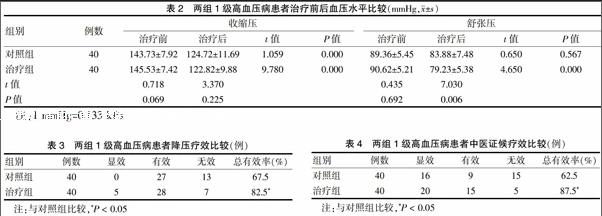耳穴贴压配合降压药物治疗1级高血压病的临床效果
2017-03-15董巧稚李岩蔡玲玲
董巧稚+李岩+蔡玲玲


[摘要] 目的 观察耳穴贴压配合降压药物治疗1级高血压病的临床效果。 方法 选择2014年10月~2015年12月在北京中医药大学东方医院心血管科门诊就诊80例高血压病1级患者作为研究對象,按随机数字表法将其分为治疗组和对照组。治疗组服用氨氯地平5 mg,1次/d,清晨口服,同时给予耳穴贴压治疗,共4周。对照组给予氨氯地平,连服4周。观察两组患者血压变化、降压疗效及中医证候疗效。 结果 ①两组患者治疗后收缩压均较治疗前显著下降(P < 0.05),治疗组治疗后舒张压显著低于治疗前(P < 0.05),而对照组治疗前后舒张压水平比较差异无统计学意义(P > 0.05);治疗组治疗后舒张压明显低于对照组(P < 0.05),而两组治疗后收缩压比较差异无统计学意义(P > 0.05)。②治疗组降压总有效率为82.5%,对照组为67.5%,差异有统计学意义(P < 0.05)。③治疗组中医证候疗效总有效率为87.5%,对照组为62.5%,差异有统计学意义(P < 0.05)。 结论 耳穴贴压配合降压药物的降压疗法不仅可明显改善1级高血压病患者的临床症状,提高患者的生活质量,还有较好的降压效果。
[关键词] 耳穴贴压;高血压病;中医证候;疗效
[中图分类号] R544.1 [文献标识码] A [文章编号] 1673-7210(2017)01(a)-0094-04
[Abstract] Objective To observe the clinical effects of auricular-plaster therapy cooperated with antihypertensive drugs in the treatment of grade 1 hypertension disease. Methods Eighty patients with grade 1 hypertension disease treated in the Outpatient Department of Cardiology, Dongfang Hospital of Beijing University of Chinese Medicine from October 2014 to December 2015 were selected as research objects, and they were randomly divided into treatment group and control group by random number table method. The treatment group was given Amlodipine 5 mg orally in the morning, once a day, and auricular-plaster therapy was given to the treatment group, total for 4 weeks. While the control group was just treated with Amlodipine, for 4 weeks. The changes of blood pressure, the antihypertensive effect and curative effect of TCM syndrome in the two groups were observed. Results ①The systolic blood pressure of the two groups after treatment were all significantly lower than those before treatment (P < 0.05), the diastolic blood pressure in the treatment group after treatment was significantly lower than that before treatment (P < 0.05), but there was no significant difference of diastolic blood pressure of the control group before and after treatment (P > 0.05). The diastolic blood pressure of the treatment group after treatment was significantly lower than that of control group (P < 0.05), while there was no statistically significant difference of systolic blood pressure after treatment between the two groups (P > 0.05). ②The total effective rate of antihypertension in the treatment group was 82.5%, which of the control group was 67.5%, the difference was statistically significant (P < 0.05). ③The total effective rate of TCM syndrome in the treatment group was 87.5%, which of the control group was 62.5%, the difference was statistically significant (P < 0.05). Conclusion The antihypertensive therapy of auricular-plaster therapy cooperated with antihypertensive drugs not only can significantly improve the clinical symptoms of patients with grade 1 hypertension, enhance the quality of life, but also has better antihypertensive effects.
